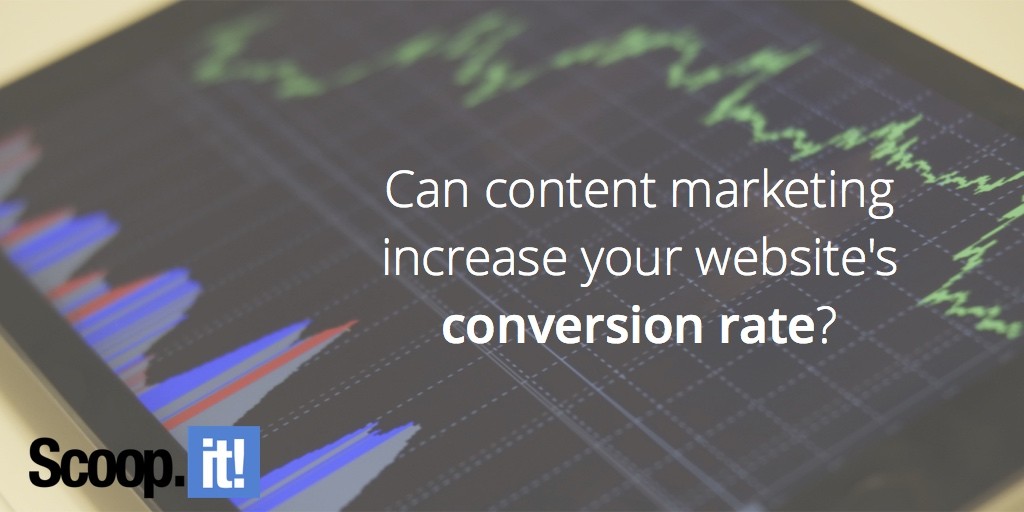
You know content marketing can bring your site more traffic. But could it actually improve the conversion rate of that traffic?
Yes. And there’s quite a lot of evidence to prove it.
But it’s not 100% conclusive. Some of the evidence tying content marketing to conversion rate lifts is a bit … circumstantial.
Content marketing clearly can improve conversion rates, but it’s hard to say for certain whether it’s the content marketing itself, or the branding that the content supports, or the trust that the content engenders. Or simply that better SEO (the results of good content marketing) might also improve conversion rates.
Whew.
Here’s an example:
- Is your content improving your conversion rates, or are those conversion rates doing better because your audience trusts you more?
- Or are your conversion rates going up because you’re trying to improve the performance of your content?
- Or do either of those things really matter at all? If good content marketing tends to improve conversion rates, isn’t that good enough? Why split things down to the atomic level?
Despite the murkiness, I think there’s a strong argument to be made that content marketing actually can increase the conversion rate of your entire website, and even your off-site conversions.
So I’m going to make that argument. Dispute it if you want – the comments section is at the bottom of this page.
But there are quite a few studies that strongly suggest – if not directly prove – that doing content marketing will increase your website’s overall conversion rate.
Here they are:
1. Direct evidence that content marketing generates “lift” in conversion rates
Here’s the most direct evidence you’ll get: A straight-up comparison of the conversion rate for content marketing users versus non-users.
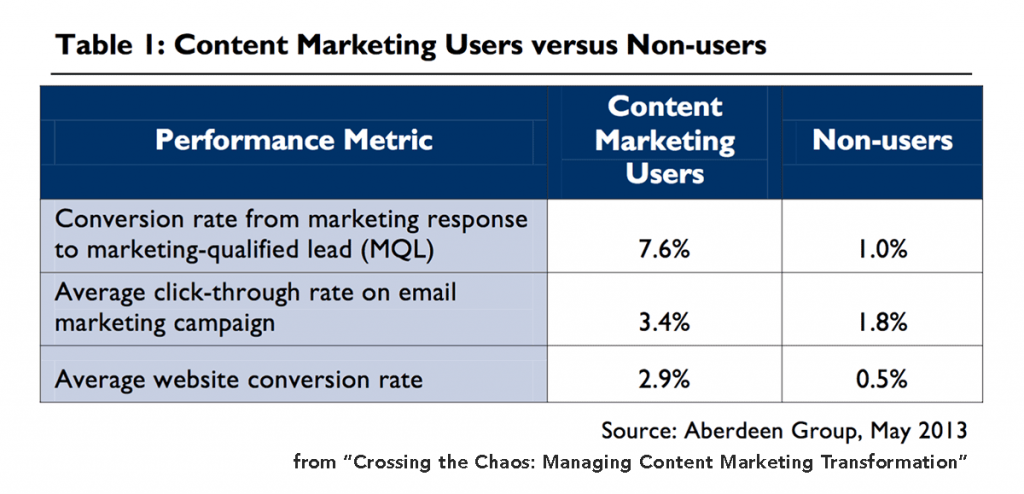
It’s no small difference, either: 2.9% for the content marketers versus .5% for the folks not doing content marketing. That’s almost a 6x improvement.
And the better you are at content marketing, the more likely it is to work. Aberdeen also found that the “leading” content marketing teams were able to outperform their peers by about a third across several different metrics.
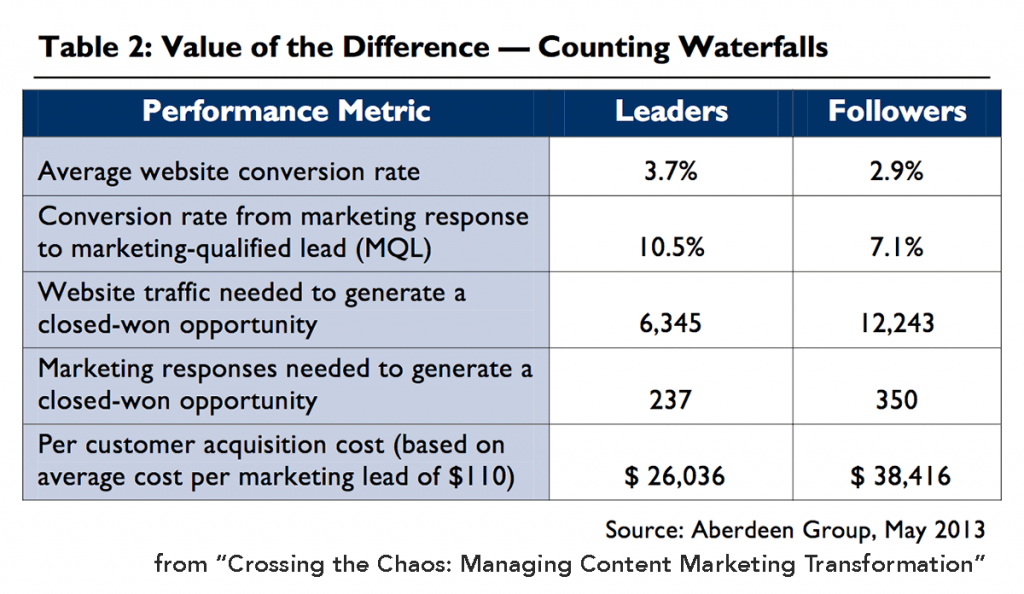
Now, how much weight would I give this study? A lot. But it’s also the only straight-up study that has documented how content marketing can increase conversion rates.
I worry about declaring something true if I’ve only got one data point.
The research is also a little older than I’d like (2013 was a long time ago in internet years). But human behavior also doesn’t change very fast – we’re still largely operating from caveman instincts.
And content marketers have only gotten better in the last few years. It’s possible that if Aberdeen re-did this study, they might find the content marketers get even higher conversion rates compared to companies who aren’t producing content.
2. Conversion rates from return visitors are higher than the conversion rates from first-time visitors
One of the core goals of content marketing is to attract and retain an audience. And while we may put some of our content out on the web and social media, smart marketers know you ultimately want to be driving people back to your site.
So content marketing is, in part, an exercise in getting people to come back to your site.
That’s why we want to get peoples’ email addresses, to get them to follow us on social media. Because we don’t want them to come across our content once, then never come back again. One of the core jobs of our content is to lure them back.
Well, that luring raises conversion rates. Return visits tend to convert better than first-time visits. By a lot – like two to three times better.
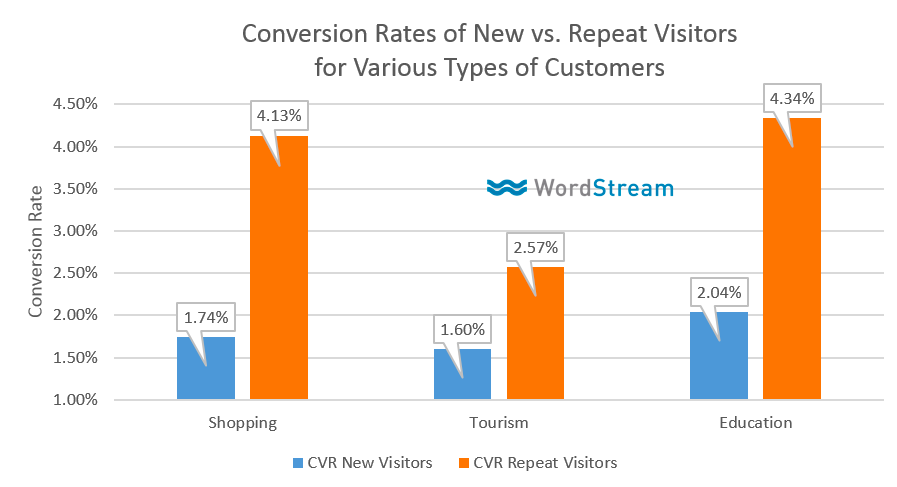
This actually isn’t too surprising. One of the other good things content marketing does is build trust. More trust means more sales. The people who come back to our sites, and engage with our content a few times are more likely to trust us.
This is even more of an opportunity than it first appears to be.
You see, there’s ample evidence that good content marketing can generate considerably more search engine traffic than if you weren’t generating any content.

Like 7.8 times more. That’s according to Aberdeen, from that same report. They discovered that “annual growth in unique site traffic is 7.8x higher for content marketing leaders compared to followers (19.7% versus 2.5%).
You don’t even necessarily have to create the content, either. Even content curation can generate a lot of search engine traffic.
3. Even before people come back to your site, if they’ve seen your content before, they’ll remember your brand better
This makes them more likely to click your ads, and more likely to click your page among the search results. And more likely to convert.
Rand Fishkin of Moz has an entire Whiteboard Friday video dedicated to this effect. Once you’ve seen him walk through everything that’s going on with how branding can influence search behavior, it’s hard to believe your brand wouldn’t affect the click-through rate your pages get when they appear in the search results.
And for most of this video, you could replace the word “brand” with the word “content marketing” and most of Rand’s points would still apply.
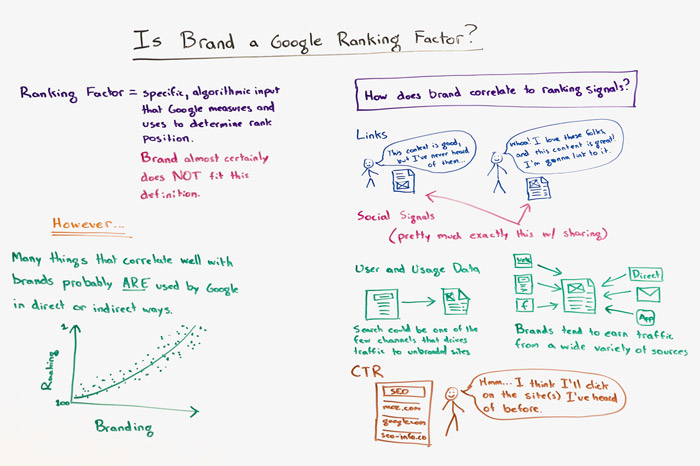
So once again, we have content marketing getting you more search traffic, while also increasing the conversion of that traffic.
We’re also getting into the territory where it becomes hard to separate content marketing and SEO, and the benefits of either one (or both). But either way, it’s a good thing.
Conclusion
Content marketing may not only be bringing you more traffic. It may also be increasing the effectiveness (the value, the conversion rate – however you want to say it) of that traffic.
In other words, it’s got a multiplier effect.
This might even be another way to measure the return on your content marketing: How much is it worth to your company to improve your conversion rate by a factor of six? Or more modestly, by a factor of two or three. A conversation rate improvement of that magnitude could create a LOT more profits.
Depending on your business and the results you’ve been getting, just looking at that one improvement – a better conversion rate – might be able to pay for a lot of your content marketing. Maybe even all of it.
Add in the known search engine traffic increases, and the pitch gets even easier.
Back to you
What do you think? Is this all hocus pocus with the conversion rates? Is it questionable research? Have your say in the comments.
Or better yet – have you seen any increases (or decreases) in conversion rates since you started doing content marketing? Do you attribute those improvements to the content, or maybe “just” to the fact that you’re paying more attention to how your marketing performs overall?
However you see it, we welcome your thoughts.
Image by Burak Kebapci



 (3 votes, average: 4.67 out of 5)
(3 votes, average: 4.67 out of 5)